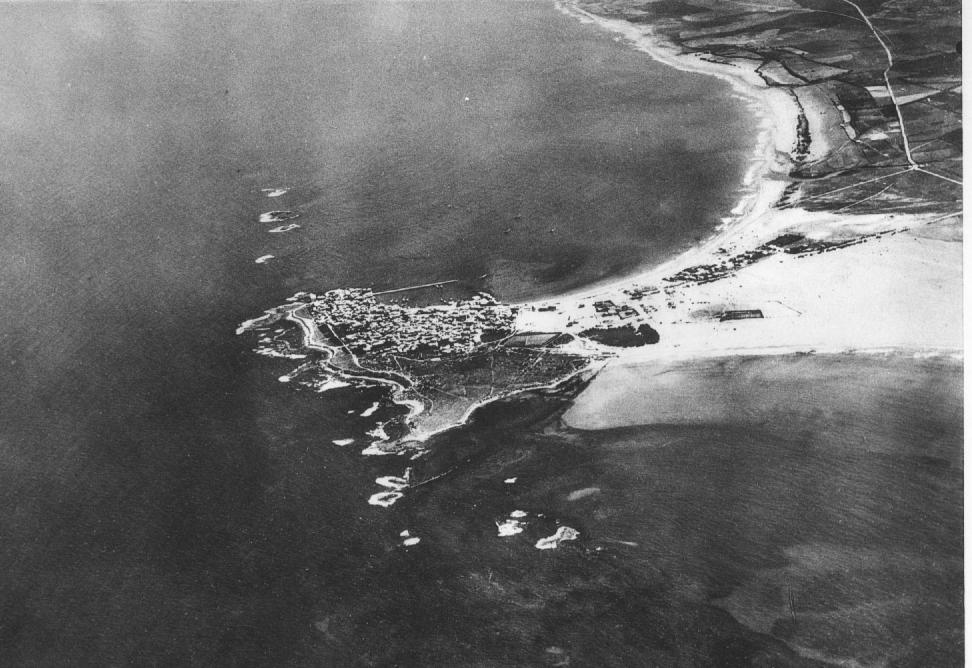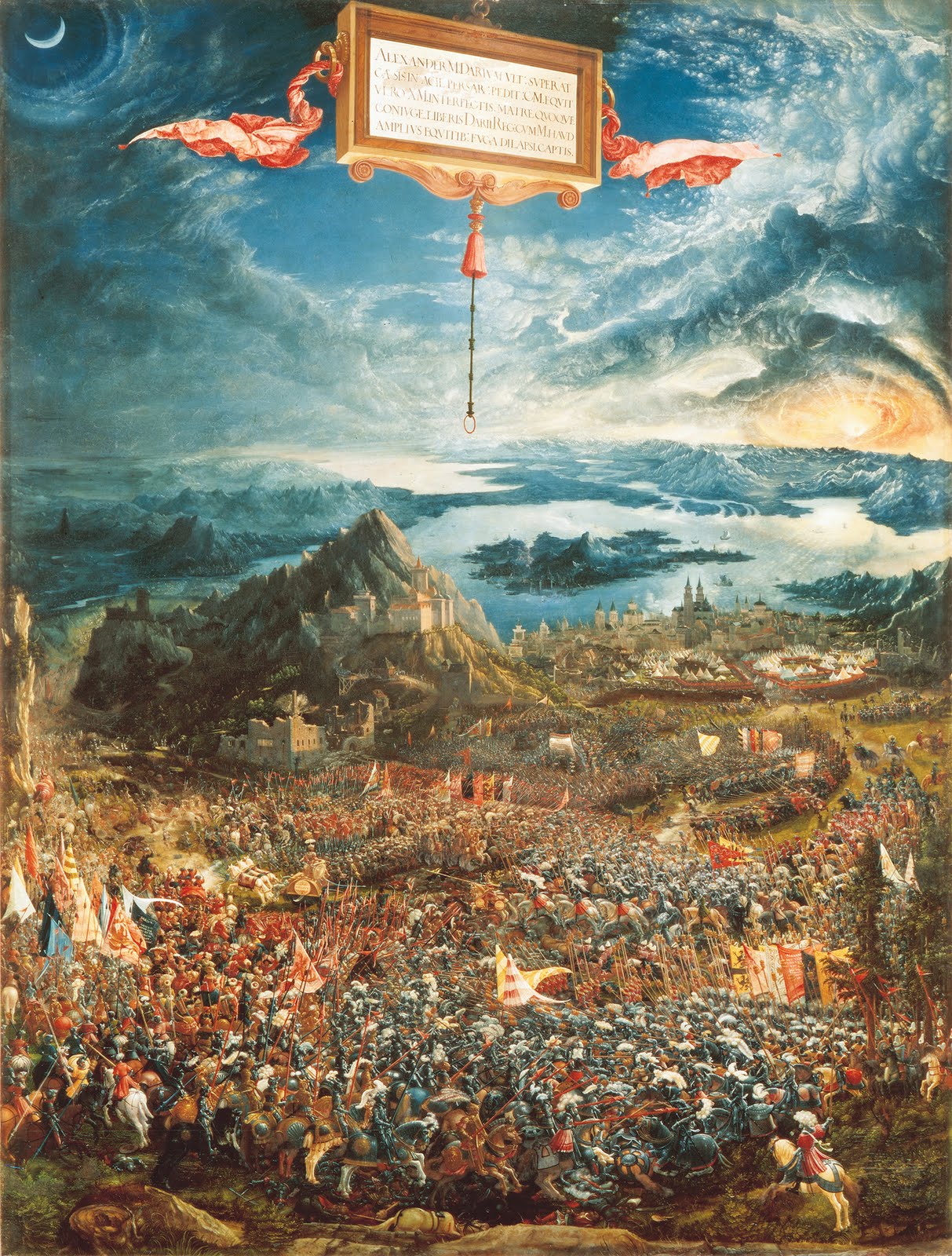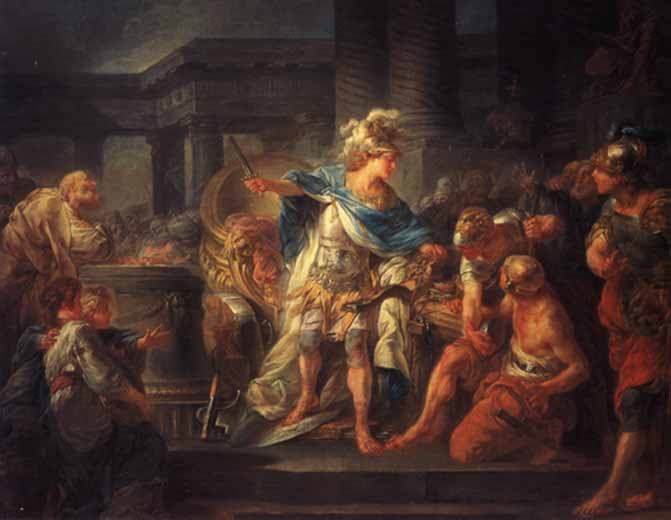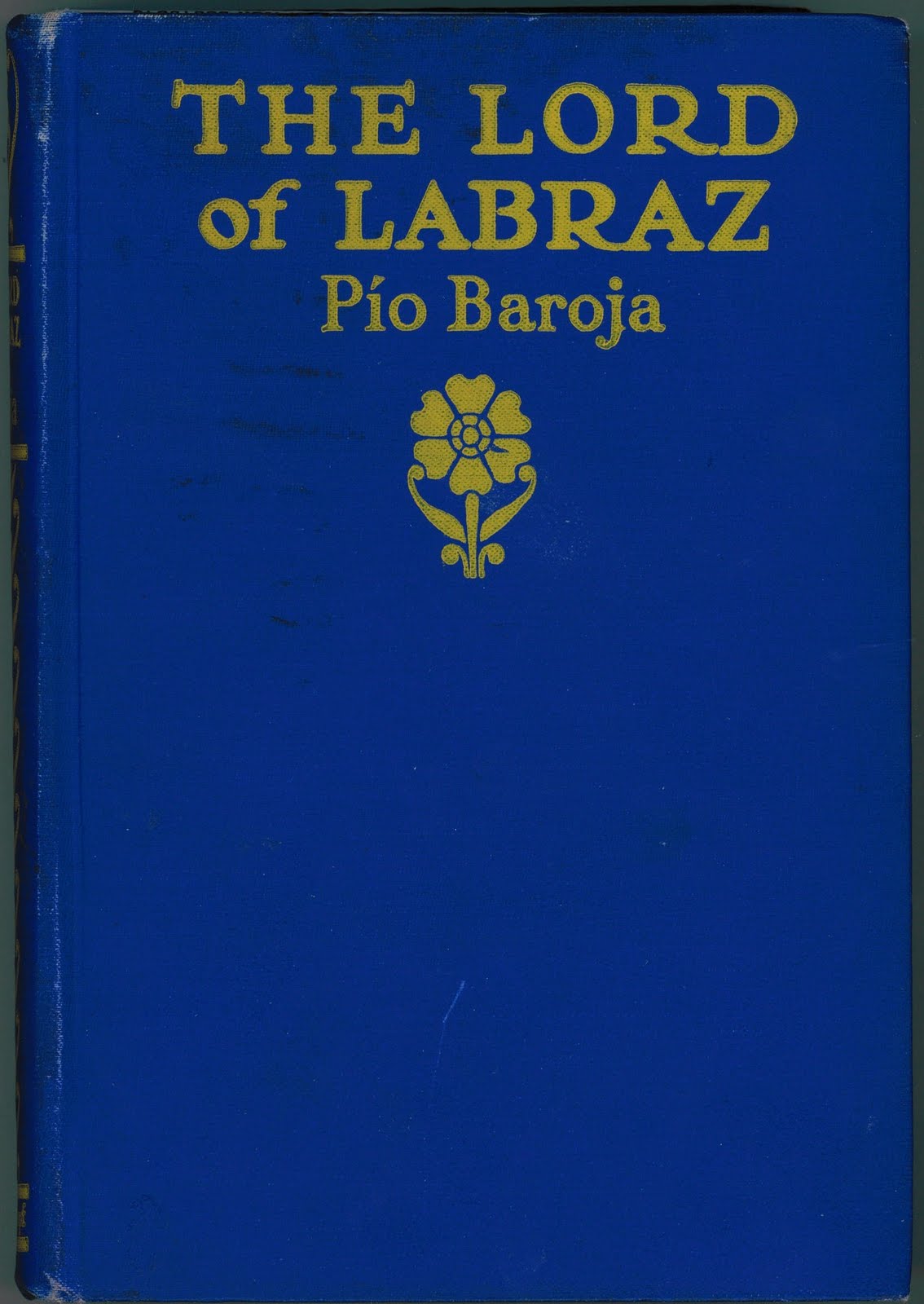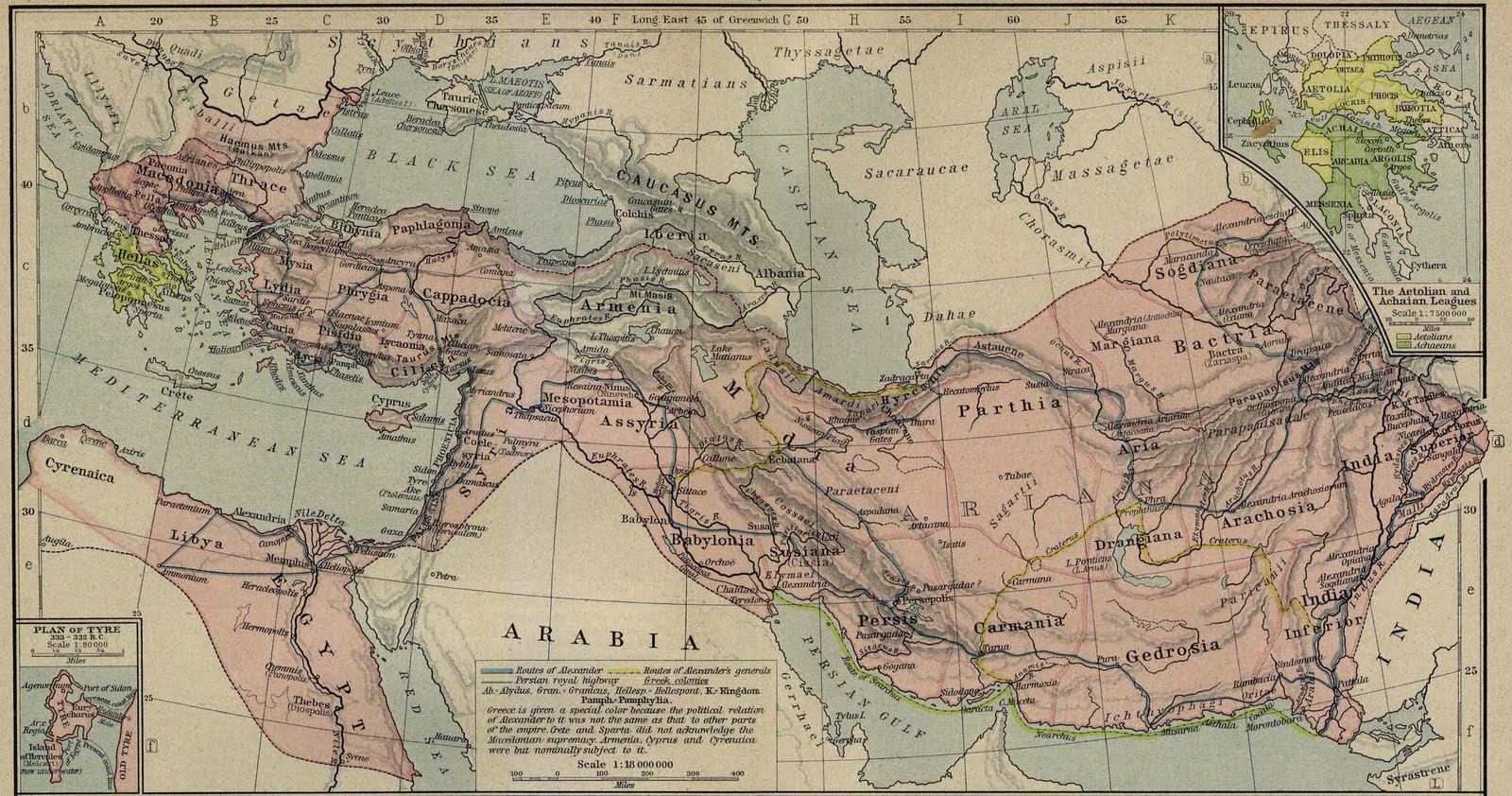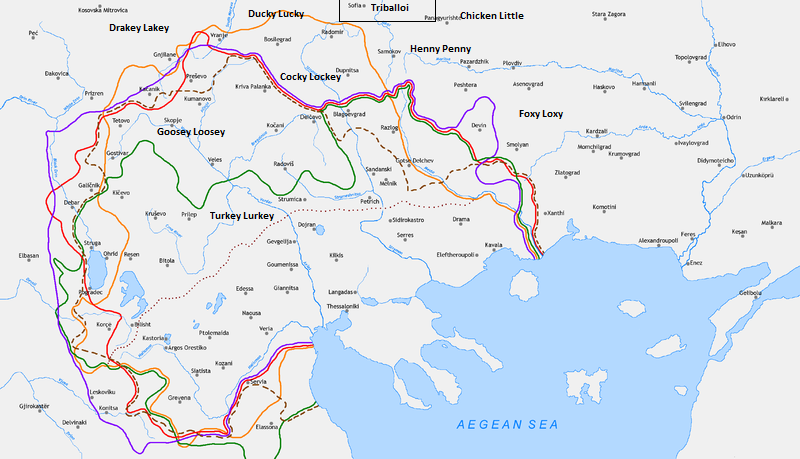All quotes are from The Landmark Arrian: The Campaigns of Alexander, translation by Pamela Mensch. I wanted to add a few words on a few things that stand out about Arrian so far in his book on Alexander. Even though Arrian writes about events occurring 400 years earlier and is reworking Ptolemy’s and Aristobulus’ accounts […]
Aerial photo of Tyre, 1934 Picture source The mole that Alexander had built out to the city has silted up over timeAll quotes are from The Landmark Arrian: The Campaigns of Alexander, translation by Pamela Mensch. I didn’t spend much time talking about the battle of Issus but I do need to recommend The Landmark […]
Battle of Issus, Albrecht Altdorfer Picture source (be sure to click on picture for more detail) All quotes are from The Landmark Arrian: The Campaigns of Alexander, translation by Pamela Mensch. In the previous post I mentioned Alexander undoing the Gordion (Gordian) knot as part of the myth-building process. What I didn’t mention was the […]
Alexander cuts the Gordian Knot, Jean-Simon Berthélemy Picture sourceIn addition to his brilliance at military tactics and strategy, Alexander proves to be an adept leader of his men. At the same time he takes care to cultivate his reputation, both for current impact and for future generations. All quotes are from The Landmark Arrian: The […]
The Marathon2500 Project conference call on “Herodotus and the Invention of History” just finished. It was a very relaxed talk by Robert Stassler, the creator of the Landmark series (among other things) as well as questions and discussion with Professor Paul Cartledge on Herodotus, Marathon, and the “invention” of history. My favorite part was Stassler […]
In Book One Arrian establishes Alexander as trusting and generous with his friends while not hesitating to punish turncoats. The latter group includes Greeks who found it more expedient to follow or sympathize with the Persians. Greek mercenaries were harshly punished, at least at the battle of the Granicus River. However Alexander spared the small […]
I occasionally go back to posts, especially the online resources posts, to update them with additional information or links as I find them. Here are some updates to those posts: The podcast for the April 5th conference call in the Marathon2500 series. This podcast covers “War and Sports” with Professor Thomas Scanlon. I enjoyed it […]
The Lord of Labraz by Pío Baroja, translated by Aubrey F. G. Bell, Alfred A. Knopf, 1926 (originally released in 1903 in Spanish)I mentioned in an earlier post that decay was a central theme in this book. Labraz, an imaginary town set in the Cantabria region of Spain, fought progress tooth and nail and won […]
The Lord of Labraz by Pío Baroja, translated by Aubrey F. G. Bell, Alfred A. Knopf, 1926 (originally released in 1903 in Spanish) Labraz is a much simpler story than his Struggle for Life trilogy but that doesn’t make it less pleasurable to read. Structured (so far) like a romance, it’s fun to watch him […]
The Lord of Labraz by Pío Baroja, translated by Aubrey F. G. Bell, Alfred A. Knopf, 1926 (originally released in 1903 in Spanish) From TIME.com’s August 30, 1926 book reviews: The Spanish hail Señor Baroja as their most popular living talespinner. He writes a little like Dickens, a little like Stevenson, always like a Spaniard—that […]
The Lord of Labraz by Pío Baroja, translated by Aubrey F. G. Bell, Alfred A. Knopf, 1926 (originally released in 1903 in Spanish) I’ve discovered Pío Baroja recently and have enjoyed what I’ve read. To say he’s inconsistent in many areas would be an understatement but part of his writing has appealed to me. So […]
A few stray thoughts during the conference call covering Book One of The Landmark Arrian: The Campaigns of Alexander, translation by Pamela Mensch this evening, some have been bubbling beneath the surface while others were spurred by other comments. One of the first points discussed was Arrian’s assessment as a historian. For ancient historians, Herodotus […]
A few additional thoughts I wanted to add to my previous post on the battle at the Granicus River… To camp or not to camp 1. When Alexander learned of the concentration of the Persian forces, he advanced rapidly and encamped opposite the enemy, so that the Granicus flowed between the encampments. 2. The Persians, […]
Then he went to Delphi, to consult Apollo concerning the success of the war he had undertaken, and happening to come on one of the forbidden days, when it was esteemed improper to give any answers from the oracle, he sent messengers to desire the priestess to do her office; and when she refused, on […]
There are many aspects of Alexander that could be discussed from Book One such as the ingenuity demonstrated in avoiding the Thracian carts or in crossing the Danube with hay-filled tents. There is a lot to look at in his mature military tactics demonstrated at the Granicus River or his ability to improvise during the […]
Arrian takes pride in his work, most notably in the two prologues in Book One. In these passages he directly addresses the reader, stressing the greatness of his subject and, by association as his chronicler, of himself. I think it’s worth taking a minute to look at Arrian’s claims in these prefaces or prologues. The […]
Alexander’s shrewdness when choosing the appropriate action to advance short- and long-term goals lies in his ability to take differing positions when necessary. This post looks at a few of his different approaches to battles in Book One of The Landmark Arrian: The Campaigns of Alexander, translation by Pamela Mensch (source for all quotes). Alexander […]
Part of Alexander’s greatness or shrewdness derived from his ability to choose an action that advanced his short- and long-term goals. The next couple of posts will look at Book I of Arrian’s history and highlight a few of these choices and how they furthered his objectives even though his actions can appear inconstant and […]
Picture sourceOne great thing about the Landmark editions is the support provided within each book: maps, indexes, annotations, appendices help make reading the work more rewarding and enjoyable. Providing an online resource post for a book from the series seems unnecessary but I like to do it anyway. The Internet Ancient History Sourcebook links related […]
Envoys now visited Alexander from all the other autonomous tribes settled near the Danube and from Syrmos, the king of the the Triballoi. Envoys also arrived from the Celts who dwelt on the Ionian Gulf. Men of enormous stature, the Celts had a high opinion of themselves. All the envoys had come desiring Alexander’s friendship, […]
